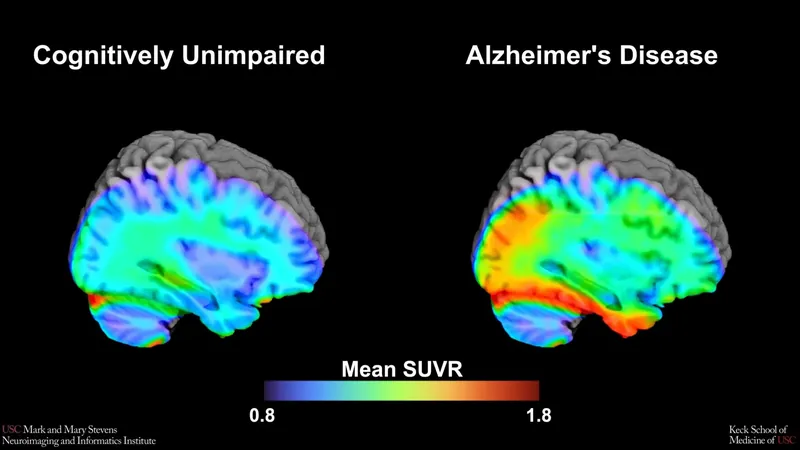
Unlocking Better Sleep in Perimenopause: The Surprising Link Between Sleep and Estrogen Levels
2024-09-28
Author: Mei
Introduction
Cisgender women typically face the unique phase of perimenopause four to eight years before officially entering menopause. This transition can introduce a myriad of physical and emotional changes, often including troublesome sleep disorders. Research indicates that nearly 47% of women in this stage report experiencing sleep-related issues, leading to interest in potential solutions.
The Connection Between Estrogen and Sleep
Recent studies suggest an intriguing connection between estrogen levels and sleep patterns in perimenopausal women. During perimenopause, estrogen production decreases as a woman’s ovaries begin to wind down, causing irregular menstrual cycles and a range of symptoms—hot flashes, night sweats, fatigue, shifts in mood, and sleep disturbances being among the most common.
Research by Dr. Amy Divaraniya
A prominent voice in this ongoing research is Dr. Amy Divaraniya, founder and CEO of Oova, a company dedicated to women’s health through biomarker tracking. At the recent North American Menopause Society (NAMS) conference, she unveiled findings indicating that sleep duration may directly affect estrogen levels, particularly the metabolite E3G. This correlation signals an important shift in understanding how hormonal changes influence sleep quality during perimenopause.
Study Insights
In a recent study involving 503 self-identified perimenopausal women, participants utilized Oova's at-home hormone monitoring kit to detail their sleep patterns. Each kit measured critical hormones such as estradiol, luteinizing hormone (LH), and progesterone, providing insights into the relationships between these hormones and sleep duration.
Dr. Divaraniya noted an interesting result: women who consistently reported sleeping between six to nine hours showed significantly higher E3G levels than those getting only three to six hours of sleep. There were, however, no notable differences in LH and progesterone levels based on sleep duration.
Impact of Hormones on Sleep
"This connection makes sense," Dr. Divaraniya stated. "Lower estrogen levels could lead to increased cortisol, the stress hormone, which commonly disrupts sleep and raises anxiety." These findings reveal a pathway worth exploring further; if validated, they hold the potential to dramatically enhance quality of life for women grappling with sleep issues during this transformative period.
Future Directions
Furthermore, Dr. Divaraniya envisions future interventions designed to bolster sleep quality as a means to counteract the hormonal shifts experienced during perimenopause. She emphasizes the necessity of understanding the physiological mechanisms behind sleep disturbances, eyeing a future where targeted solutions become viable.
Expanding the Research
Beyond sleep and hormones, Oova is delving into other perimenopausal symptoms through similar digital tracking methods, hoping to uncover additional hormonal patterns that may shed light on comprehensive care strategies for women during this phase.
Recommendations for Women
For women navigating perimenopause, Dr. Divaraniya recommends: 1. **Track your Sleep**: Keep a detailed record of your sleep hours and experiences. 2. **Monitor Hormone Levels**: Utilize hormone tracking solutions to better understand your body’s changes. 3. **Seek Support**: If sleep issues persist, consult with healthcare professionals about personalized strategies.
Conclusion
As sleep difficulties can often be tied to fluctuating estrogen levels, recognizing these patterns may be the first step toward regaining control over health and well-being during this pivotal time in life. Stay informed, and you might just sleep better knowing you’re in tune with your body’s signals!





 Brasil (PT)
Brasil (PT)
 Canada (EN)
Canada (EN)
 Chile (ES)
Chile (ES)
 Česko (CS)
Česko (CS)
 대한민국 (KO)
대한민국 (KO)
 España (ES)
España (ES)
 France (FR)
France (FR)
 Hong Kong (EN)
Hong Kong (EN)
 Italia (IT)
Italia (IT)
 日本 (JA)
日本 (JA)
 Magyarország (HU)
Magyarország (HU)
 Norge (NO)
Norge (NO)
 Polska (PL)
Polska (PL)
 Schweiz (DE)
Schweiz (DE)
 Singapore (EN)
Singapore (EN)
 Sverige (SV)
Sverige (SV)
 Suomi (FI)
Suomi (FI)
 Türkiye (TR)
Türkiye (TR)
 الإمارات العربية المتحدة (AR)
الإمارات العربية المتحدة (AR)